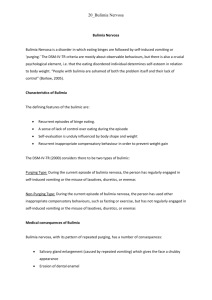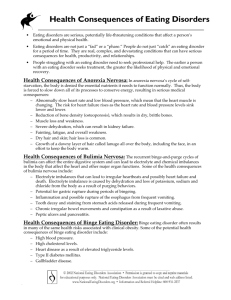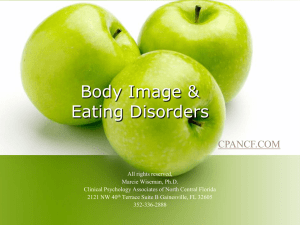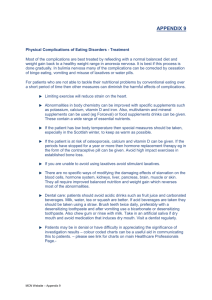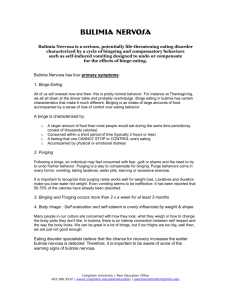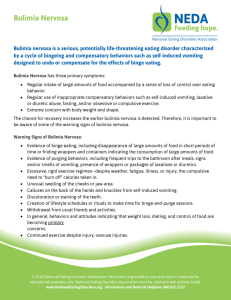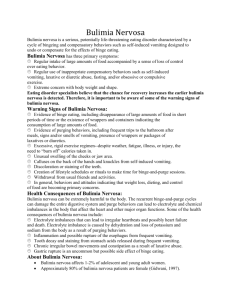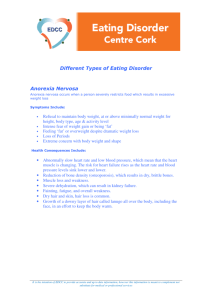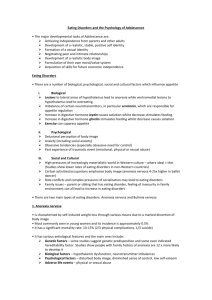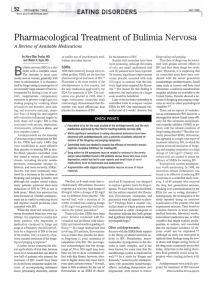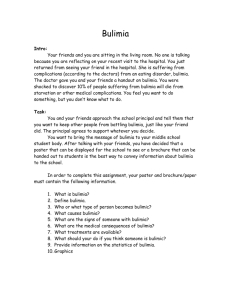Fact Sheet Bulimia nervosa
advertisement
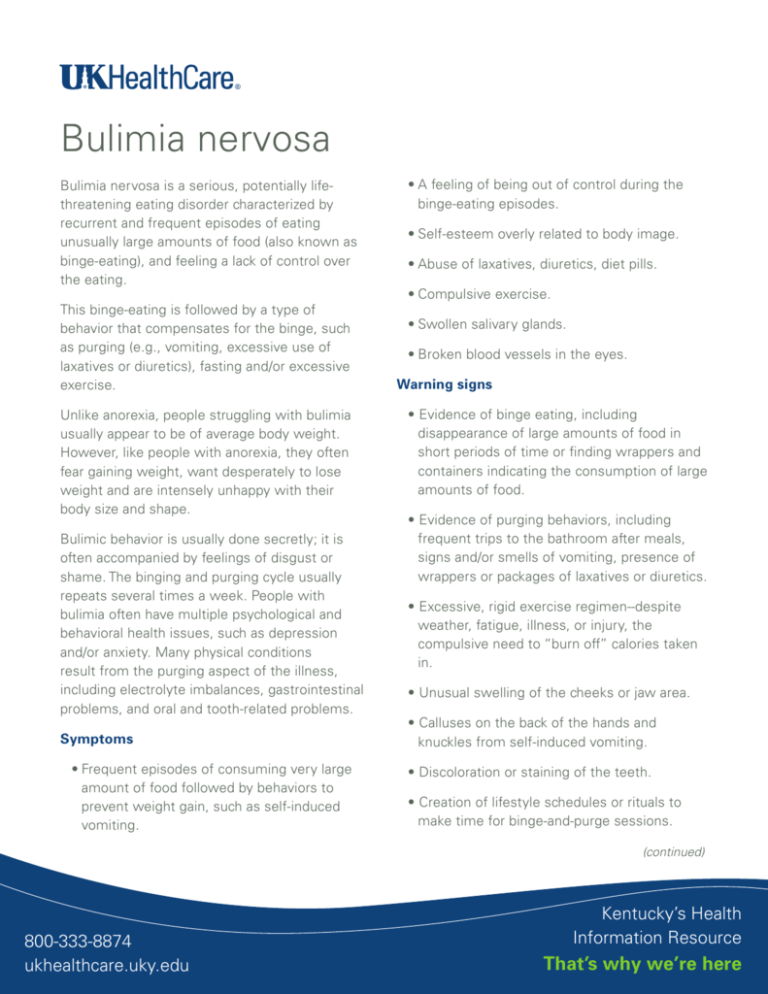
Bulimia nervosa Bulimia nervosa is a serious, potentially lifethreatening eating disorder characterized by recurrent and frequent episodes of eating unusually large amounts of food (also known as binge-eating), and feeling a lack of control over the eating. This binge-eating is followed by a type of behavior that compensates for the binge, such as purging (e.g., vomiting, excessive use of laxatives or diuretics), fasting and/or excessive exercise. Unlike anorexia, people struggling with bulimia usually appear to be of average body weight. However, like people with anorexia, they often fear gaining weight, want desperately to lose weight and are intensely unhappy with their body size and shape. Bulimic behavior is usually done secretly; it is often accompanied by feelings of disgust or shame. The binging and purging cycle usually repeats several times a week. People with bulimia often have multiple psychological and behavioral health issues, such as depression and/or anxiety. Many physical conditions result from the purging aspect of the illness, including electrolyte imbalances, gastrointestinal problems, and oral and tooth-related problems. Symptoms •Frequent episodes of consuming very large amount of food followed by behaviors to prevent weight gain, such as self-induced vomiting. •A feeling of being out of control during the binge-eating episodes. •Self-esteem overly related to body image. •Abuse of laxatives, diuretics, diet pills. •Compulsive exercise. •Swollen salivary glands. •Broken blood vessels in the eyes. Warning signs • Evidence of binge eating, including disappearance of large amounts of food in short periods of time or finding wrappers and containers indicating the consumption of large amounts of food. • Evidence of purging behaviors, including frequent trips to the bathroom after meals, signs and/or smells of vomiting, presence of wrappers or packages of laxatives or diuretics. • Excessive, rigid exercise regimen--despite weather, fatigue, illness, or injury, the compulsive need to “burn off” calories taken in. • Unusual swelling of the cheeks or jaw area. • Calluses on the back of the hands and knuckles from self-induced vomiting. • Discoloration or staining of the teeth. • Creation of lifestyle schedules or rituals to make time for binge-and-purge sessions. (continued) 800-333-8874 ukhealthcare.uky.edu Kentucky’s Health art | science | healing Information Resource ukhealthcare.uky.edu/new ukhealthcare.uky.edu/new That’s why we’re here • Withdrawal from usual friends and activities. Resources • In general, behaviors and attitudes indicating that weight loss, dieting, and control of food are becoming primary concerns. Health consequences bulimia nervosa UK Adolescent Behavioral Health UK Good Samaritan Hospital (Inpatient care) 310 S. Limestone Lexington 800-776-2673 (toll free) or 859-226-7060 Fax: 859-226-7064 ukhealthcare.uky.edu/behavioral-health/ Bulimia nervosa can be extremely harmful to the body. The recurrent binge-and-purge cycles can damage the entire digestive system and purging behaviors can lead to electrolyte and chemical imbalances in the body that affect the heart and other major organ functions. Some of the health consequences of bulimia nervosa include: UK Adolescent Medicine Kentucky Clinic (Outpatient care) Fourth floor, Wing D 740 S. Limestone Lexington 859-323-5643 ukhealthcare.uky.edu/adolescent-medicine/ • Continued exercise despite injury; overuse injuries. •Electrolyte imbalances that can lead to irregular heartbeats and possibly heart failure and death. Electrolyte imbalance is caused by dehydration and loss of potassium and sodium from the body as a result of purging behaviors. •Inflammation and possible rupture of the esophagus from frequent vomiting. •Tooth decay and staining from stomach acids released during frequent vomiting. •Chronic irregular bowel movements and constipation as a result of laxative abuse. •Gastric rupture is an uncommon but possible side effect of binge eating. Additional resources: National Institute of Mental Health 5600 Fishers Lane, Room 7C-02 Rockville, MD 301-443-4513 www.nimh.nih.gov National Eating Disorders Association 165 West 46th Street Suite 402 New York 800-931-2237 http://www.nationaleatingdisorders.org/ Actions you can take If you are concerned about the behavior of a loved one and think they need to be hospitalized, adult or adolescent, call 859-226-7063 for adults and 800-776-COPE (2673) for adolescents. UK HealthCare can offer you and your loved one the care and support needed to fight this disease. 5-6235 art | science | healing ukhealthcare.uky.edu/new 5-6235 ©2014 UK HealthCare, University of Kentucky
